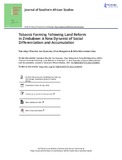| dc.contributor.author | Shonhe, Toendepi | |
| dc.contributor.author | Scoones, Ian | |
| dc.contributor.author | Mutyasira, Vine | |
| dc.contributor.author | Murimbarimba, Felix | |
| dc.coverage.spatial | Zimbabwe | en |
| dc.date.accessioned | 2022-04-07T12:32:36Z | |
| dc.date.available | 2022-04-07T12:32:36Z | |
| dc.date.issued | 2022-04-04 | |
| dc.identifier.citation | Shonhe, T.; Scoones, I.; Mutyasira, V. and Murimbarimba, F. (2022) Tobacco Farming Following Land Reform in Zimbabwe: A New Dynamic of Social Differentiation and Accumulation, Journal of Southern African Studies, DOI: 10.1080/03057070.2022.2030954 | en |
| dc.identifier.uri | https://opendocs.ids.ac.uk/opendocs/handle/20.500.12413/17296 | |
| dc.description.abstract | Tobacco has been central to the agrarian economy of Zimbabwe since the early 1900s, when it became the backbone of the new settler economy following colonisation. Since the land reform of 2000, tobacco has taken on a new impetus, with production now often exceeding that generated by white commercial farming in the 1990s. Today, tobacco is being produced predominantly by smallholders, with those on resettlement land being especially important. Tobacco production is supported by a range of buying companies, auction houses, transporters and contract arrangements, and small-scale farmers are thus tightly connected to a global commodity chain. This article explores tobacco production in A1 (smallholder) resettlement schemes in Mvurwi area, Mazowe district, a high-potential area to the north of Harare. The article is based on a combination of surveys and in-depth interviews with farmers carried out between 2017 and 2019. The article explores who are the winners and losers in the changing dynamics of smallholder tobacco production in these land reform sites and how different groups of farmers combine tobacco with other crops and with off-farm enterprises. Drawing on a simple typology of producers derived from the analysis of survey data from 310 A1 farmers, we examine the role of tobacco in complex patterns of accumulation and social differentiation, looking at class, gender and age dynamics. The conclusion discusses how the tobacco boom is reshaping the agrarian economy and its underlying social relations. This is a highly dynamic setting, influenced by how tobacco production is incorporated into farming systems, how its production is financed, how and where it is marketed and how it is combined with other crops and other income-earning opportunities. | en |
| dc.language.iso | en | en |
| dc.publisher | Routledge | en |
| dc.rights.uri | http://creativecommons.org/licenses/by-nc-nd/4.0/ | en |
| dc.subject | Agriculture | en |
| dc.subject | Development Policy | en |
| dc.subject | Rural Development | en |
| dc.title | Tobacco Farming Following Land Reform in Zimbabwe: A New Dynamic of Social Differentiation and Accumulation | en |
| dc.type | Article | en |
| dc.rights.holder | © 2022 The Author(s). Published by Informa UK Limited, trading as Taylor & Francis Group | en |
| dc.identifier.externaluri | https://www.tandfonline.com/doi/full/10.1080/03057070.2022.2030954 | en |
| dc.identifier.team | Rural Futures | en |
| dc.identifier.doi | 10.1080/03057070.2022.2030954 | |
| dcterms.dateAccepted | 2022-03 | |
| rioxxterms.funder | Department for International Development, UK Government | en |
| rioxxterms.identifier.project | APRA | en |
| rioxxterms.version | VoR | en |
| rioxxterms.versionofrecord | 10.1080/03057070.2022.2030954 | en |
| rioxxterms.funder.project | e1f6d3be-457a-4f13-8b1f-6748d1402d83 | en |


